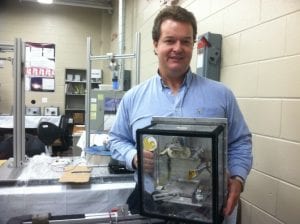Eradicating space dust and saving sea turtles get boost from space agency
Teams working on a wide range of innovative research and technology development, including work that may lead to new techniques for keeping alien dust from clogging up sensitive space instruments and work on new satellite tracking systems to help track endangered sea turtles recently got a financial boost courtesy of the Florida Space Institute.
In its second round of grants this year, the non-profit agency of the University of Central Florida in Orlando, gave 20 teams a total of just over $1 million to help propel the promising research forward and bring new NASA and National Science Foundation work to Florida.
The funds were made available to FSI through the Space Research Initiative (SRI); a collaboration between UCF and the University of Florida, created to support joint efforts between the two universities in space-related research.
“Both UCF and UF have a broad set of research capabilities in space science and technology. SRI gives researchers a running start on the most promising projects to grow Florida’s space research portfolio,” said Joshua Colwell, FSI’s assistant director.
Scientists from both universities are involved in the projects, which include experts in chemistry, physics, biology, electrical engineering, planetary science, computer science, and nanotechnology.
One of the criteria used to select winners was the likelihood these projects, once developed a bit further, could draw additional funding from federal agencies.
“UF and UCF play a vital role in advancing new space-related technologies that are essential to Florida’s long-term future as a space hub,” said David Norton, UF’s vice president for research. “By providing early-stage funding for promising ideas, the Florida Space Institute leverages state funds into federal and private funding that will result in high-paying space-related jobs in our state.”
For example, UCF Assistant Research Professor Nicoleta Hickman, an expert in photovoltaic and thermoelectric materials at the Florida Solar Energy Center in Cocoa, is working with environmental engineering professor Chang-Yu Wu at UF to develop a self-cleaning material that can be used to protect space instruments from getting clogged with dust and other debris encountered on alien planets such as Mars. It’s a huge problem encountered in each mission to Mars for example.
Keeping equipment clean is vital especially on space rovers that draw energy from the Sun during multi-year missions. If the rovers’ solar panels get too dirty, there could be a loss of power, false instrument measurements and damage to optical surfaces necessary for exploration of the planet. Millions of miles from home, a clean up crew isn’t an option. The team received $95,000 to work on a problem that is high on NASA’s priority list.
In another project, UCF Biologist John Weishampel and UF engineering professor Peter G. Ifju received $51,211 to develop computer vision algorithms to help satellite technology accurately track the nesting routes of endangered sea turtles. The team also includes Franklin Percival from the United States Geological Society Cooperative Fish and Wildlife Research Unit at UF Department of Wildlife Ecology and Conservation, UCF computer science associate professor Marshall Tappen and UCF assistant biology professor Betsy Von Holle.
FSI Director Alan Stern summed up the new awards as follows, “FSI’s Space Research Initiative is one of the ways we’re helping Florida’s space economy diversify into new areas. It’s also a key way that we increase the wheelbase of space efforts at UCF. We have been excited about the quality of innovation in the proposals we’re able to fund, and very proud to be able to give birth to these projects.”
For a complete list of the winning awards visit http://fsi.ucf.edu/

